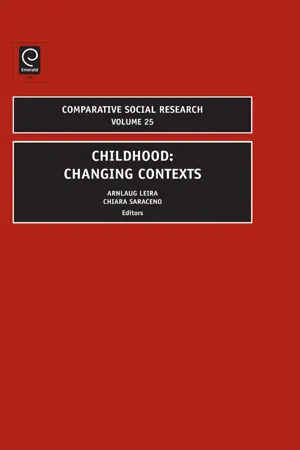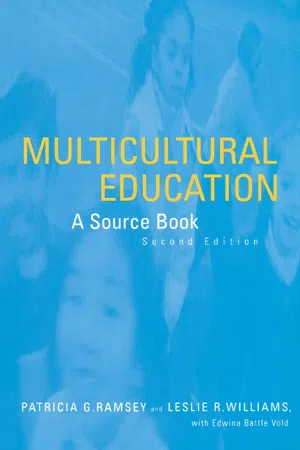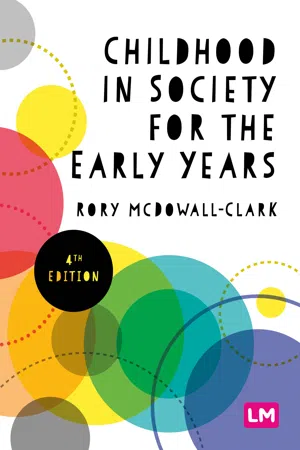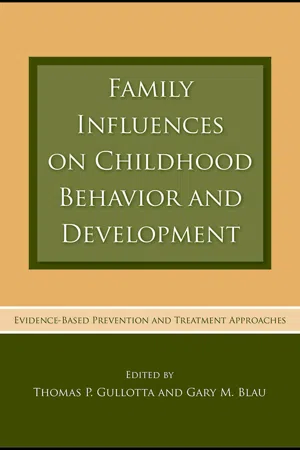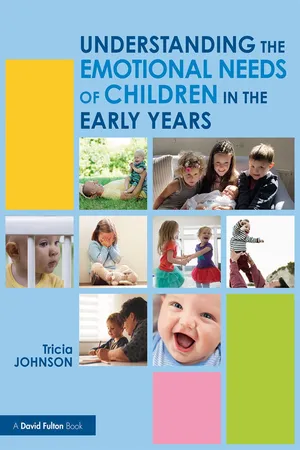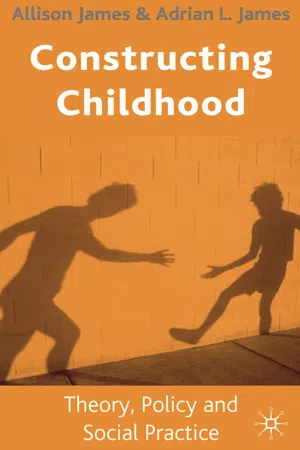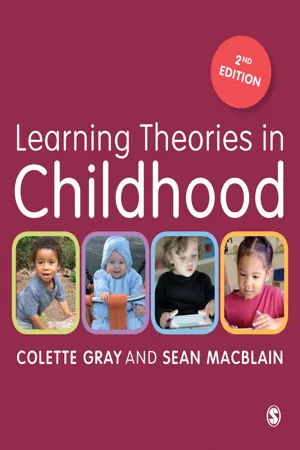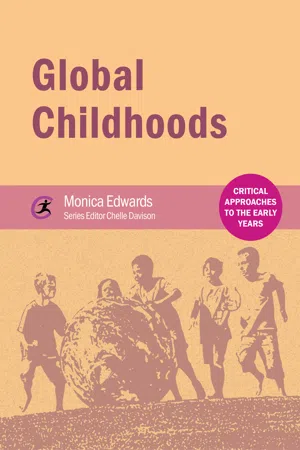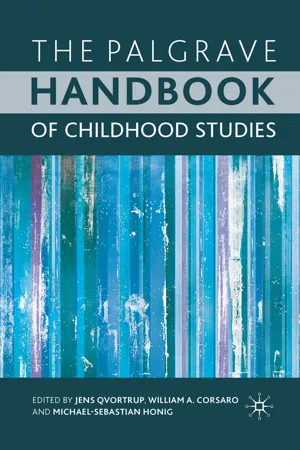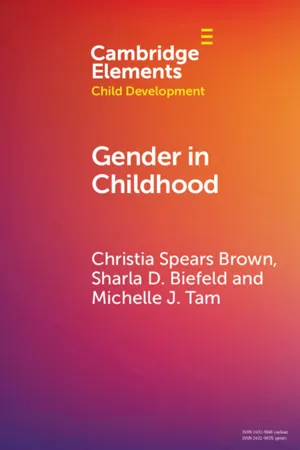Social Sciences
Cultural Differences in Childhood
Cultural differences in childhood refer to the variations in beliefs, values, behaviors, and practices related to child-rearing across different cultures. These differences can impact children's socialization, cognitive development, and emotional well-being. Understanding and respecting cultural diversity in childhood is essential for promoting inclusive and effective social and educational environments.
Written by Perlego with AI-assistance
Related key terms
1 of 5
12 Key excerpts on "Cultural Differences in Childhood"
- eBook - PDF
Childhood
Changing Contexts
- Arnlaug Leira, Chiara Saraceno, Arnlaug Leira, Chiara Saraceno, Bernard Enjolras, Karl Henrik Sivesind(Authors)
- 2008(Publication Date)
- Emerald Group Publishing Limited(Publisher)
Practice ideas about the care of children and their needs can become static and not pay attention to social change. Systems for childcare are caught in time and, once established, can be difficult to alter. They can remain the norm even when they have become inappropriate over time or by dispersal to places with different traditions. Diverse Childhoods 269 Diversity within Societies The spread and dominance of this model has obscured the depths and extent of diversity in childhood around the world. Children are not a homogenous group, even those living in small community. Children’s experiences are different, for example, taking age and gender as variables, the lives of a 7-year-old boy and a 14-year-old girl. When other factors are added in, such as disability, class or social status, wealth (such as a disabled 12-year-old boy of low status and in poverty, a non-disabled 16-year-old girl with wealthy parents), it is evident that children’s rights cannot be discussed in isolation, but through the particular circumstances of particular children. Age is of special significance for perceptions of childhood, and especially ideas of transition to youth and adulthood. Some understanding as to which categories are significant in a particular society is needed. Concepts of disability and gender issues are well known, but there are many others equally important, such as ethnicity, skin-colour, caste, class, religion etc. Cultural ideas of, and attitudes to, disability vary. For example, ‘The Massai [of Kenya] do not regard people with a disabling condition as a single unified category toward whom they relate by a standardised set of behaviours’ ( Talle, 1995, p. 56 ). Cultural norms have an impact on children’s development. For example, learning to communicate through picking up children and speaking for them in order to encourage them to talk ( Gottlieb, 2000 ). - eBook - PDF
- Roger Smith(Author)
- 2009(Publication Date)
- Bloomsbury Academic(Publisher)
However, there are a number of other significant issues raised by this brief excursion across a number of disciplinary terrains. Anthropology, for instance, illustrates demonstrable differ-ences in societies’ attitudes and practices towards children; but at the same time, it has tended to imply a degree of uniformity in the ways in which children are socialized in each setting. Implicit in this per-spective is embedded an assumption that there are discernible mate-rial differences in culture, social structure and environment, but that in essentially ‘mechanistic’ societies (Durkheim, 1947) children are 62 Theoretical Aspects of Childhood socialized into the appropriate norms and roles to be able to partici-pate and contribute effectively in the specific context in which they find themselves. While anthropologists have more recently adopted a more critical and child-centred tone, this changing mood is also apparent in other disciplinary accounts of changes in ‘modern’ societies, and the ways in which socialization processes have become more fragmented and contradictory (Valentine, 2004, for example). As attention has turned to the ways in which children make sense of their contexts and the expectations of them, it has also become clear that they are engaged in an active process of interpretation and construction of their own social worlds and sets of meanings (Corsaro, 1997; Moss and Petrie, 2002), epitomized in the lives of street children, who are ‘invisible’ to mainstream society (Ennew, 2002, p. 389). As I have suggested elsewhere (Smith, 2000a), these observations suggest that we need a processual frame of reference for understand-ing the processes by which children’s lives take the forms that they do. - eBook - ePub
Multicultural Education
A Source Book, Second Edition
- Patricia Ramsey, Leslie R. Williams, Edwina Vold(Authors)
- 2003(Publication Date)
- Routledge(Publisher)
In short, rather than “throw the baby out with the bath water,” we argue that developmental theories and research can contribute to our understanding of children’s lives and thinking. However, we must read them critically, apply them cautiously, and use them as a base to develop theories and research methods that push beyond their limits. Several authors who are reviewed in this chapter make these same arguments and illustrate them with their own work.SOCIETAL DIVISIONS AND CHILDREN’S DEVELOPMENT
Everyone in the United States lives in multiple worlds, such as work, home, community, school, social club, and church. A person may have a number of identities and behavioral repertoires that reflect her or his race, gender, class, country of origin, religion, sexual orientation, occupation, recreational pursuits, and ability/disability status. All people shift among contexts and adapt their behaviors accordingly. For instance, children learn to behave one way with neighborhood friends and another way in their classrooms. They come to expect store clerks to treat them differently than their families do. However, some children experience more discontinuities between school and home than do others. These gaps are exacerbated when children are the targets of negative stereotypes and assumptions. Moreover, resources among groups vary enormously; although some families are able to provide their children with an abundance of opportunities and services, others raise their children in extreme financial and material deprivation.As mentioned earlier, mainstream child development theory has traditionally ignored the contexts of social class, culture, ethnicity, and race (García Coll et al., 1996). Yet to work with children from diverse backgrounds and to understand the full range of their developmental potential, we need to understand what aspects of development are universal, which ones are individual, and which ones are environmental. Bowman and Stott (1994) point out that, except in conditions of extreme sensory and social deprivation, all children, regardless of background and child-rearing goals, establish mutually satisfying social relationships and ways of organizing and integrating their perceptions and categorizing new information. They also learn how to speak and perhaps to write a particular language and how to think, imagine, and create. Individual physical differences such as sensitivity to pain, distractibility, timing of onset of puberty, and body build play a formative role in children’s development. However, Bowman and Stott point out that all developmental phases and individual traits become meaningful only - eBook - ePub
- Rory McDowall Clark(Author)
- 2020(Publication Date)
- SAGE Publications(Publisher)
1 The context of childhood: social understanding of childhoodThrough reading this chapter, you will:- consider the difficulty of defining ‘childhood’ and how we determine who is considered to be a ‘child’;
- examine the conflict and ambiguities that are raised by these questions;
- understand why the social context is so critical to an understanding of childhood.
Introduction
Until the final decades of the twentieth century the idea of childhood as a distinct and separate social category had been paid very little attention. Ideas about children have abounded throughout history (and will be explored further in Chapter 2 ) but children themselves were rarely considered important enough to warrant deliberate study. By the eighteenth century scientists, philosophers and educators had begun to systematically study children and build up knowledge about them. Since then, ideas about how children grow, the developmental stages they go through and different theories of how language is acquired have emerged as subjects of study within such fields as psychology, education and health. Thus, there is now a well-established body of knowledge known as child development which is studied by all those interested in working with children. Until the last few decades, the existence of a stage in human lifespan, called ‘childhood’, was simply taken for granted, however, and the concept itself was rarely examined or questioned. Today, a distinct interdisciplinary field called ‘childhood studies’ exists, uniting different approaches from diverse academic disciplines to bring the spotlight to bear, not only on children themselves but also on childhood as a unique social category.What is childhood?
Every adult was once a child; it is the one defining characteristic that each of us has in common regardless of the myriad differences that make us unique individuals. This ought to make it a fairly simple matter to understand exactly what childhood is and what the term signifies. However, the more we try to pin down and identify what we mean by childhood, the more slippery a concept it turns out to be. The difficulties this presents help to illustrate why childhood is a cultural and social invention and why it is so important to understand the context of childhood. - eBook - ePub
Family Influences on Childhood Behavior and Development
Evidence-Based Prevention and Treatment Approaches
- Thomas P. Gullotta, Gary M. Blau, Thomas P. Gullotta, Gary M. Blau(Authors)
- 2008(Publication Date)
- Routledge(Publisher)
Table 4.2 were selected because of their relevance to conceptualizing and understanding the impact of culture on child development for children 5 to 13 years of age.A close examination of these definitions and frameworks reveals greater similarities than differences. This chapter provides a summary of the common elements most important to understanding culture:• It is applicable to all peoples. • It is value laden and tells group members how to behave and provides their identity. • It structures perceptions and shapes behaviors. • It is based on values and belief systems. • It is multifactorial, multilayered and multidimensional. • It exists at conscious and unconscious levels. • It is active, dynamic and malleable over time. • It varies in expression both among and between individual group members. • It permeates every aspect of life.These common elements indicate the complexity of culture. Culture is almost always defined within the context of a group—providing the code of behavior and the identity of a group and its members. The focus on the group within these definitions and frameworks may inadvertently obscure the individual as an active participant in the dynamics of culture. Harkness and Super (1996) developed “The Developmental Niche,” a model that explores the impact of culture on child development. This model espouses that the child is not a passive recipient of culture and that his or her unique characteristics and temperament influence the transmission of culture from caretakers, community and society as a whole. This underscores the principle that aspects of culture are manifested differently within each individual. A member of a cultural group may not necessarily embrace all of the beliefs, values, practices and modes of communication that are attributed to the group. For example, the code of behavior demonstrated by an individual may be somewhat or distinctly different from that of the group to which he or she is a member. This view of culture acknowledges the many within-group differences and the inherent diversity among each individual or group member. It is particularly relevant to children in middle childhood as peer group membership, social competence and burgeoning self-identity rank among the primary developmental tasks during this period. - Tricia Johnson(Author)
- 2018(Publication Date)
- Routledge(Publisher)
The concept of mindfulness is introduced in relation to, ‘paying more attention to the present moment – to your own thoughts and feelings, and the world around you’ (NHS 2016). Therefore, not only the effects of cultures but moods, health, expectations etc are considered. International perspectives are included when referring to the different cultures within childcare provision. Culture, in its various forms, is all around us. However, before addressing culture linked specifically to children during their early years and the different cultures that are encountered in Early Years settings it is important for you to consider the meanings of the word culture. The following definitions of culture from a Dictionary of Psychology (1995), The Concise Oxford Dictionary (1995) and from Haralambos and Holborn (2000), in their book Sociology, Themes and Perspectives provide an introduction to the concept of culture. These defini- tions are included as points of reference and points for discussion, critique and reflection. They have also been chosen to help you to maintain a focus on the meanings of the word whilst exploring the different forms of culture that exist not only within the Early Years but in our day to day lives and society as a whole. 116 The effects of different cultures experienced by very young children What is culture? Culture is: 1. The system of information that codes the manner in which the people in an organised group, society or nation interact with their social and physical envi- ronment. In this sense the term is really used so that the frame of reference is the sets of rules, regulations, mores and methods of interaction within the group. A key connotation is that culture pertains only to non-genetically given trans- mission: each member must learn the systems and the structures. 2. The group or collection of persons who share the patterned systems described in 1.- eBook - PDF
Constructing Childhood
Theory, Policy and Social Practice
- Allison James(Author)
- 2017(Publication Date)
- Red Globe Press(Publisher)
The other defines the extent to which childhood, and hence ‘the child’, is to be understood in terms of local particularities or, alternatively, as encompassed by a more universalising and global perspective. However, as heuristic devices, what these models also point to, we suggest, are four different facets of children’s experiences as children. Taken together they consti-tute and reflect the totality of the childhoods lived by children throughout the world and, from the perspective of the individual child, it is these same four positions that, in varying proportions, at any given time and in any particular social situation, combine to shape their daily lived experiences. Viewed in this slightly differ-ent way, what Figure 3.4 allows us to do, therefore, is to hold ‘the child’ and ‘childhood’ constant at any given historical moment but, at the same time, to vary the perspectives from which we view them. Children, childhood and social order Such models are, of course, simply models and in this sense they are, sociologically speaking, ideal types. Nonetheless, they are useful pointers to the ways in which we might begin to unravel the complexities of the cultural politics of childhood and account for the commonalities and diversities that unite and fracture ‘child-hood’ for children and which are core to the cultural politics of childhood. For example, by focusing on the child as social actor within the tribal model of childhood, we are able to see children exercising their agency within local contexts and in response to local particularities. And in doing so, we might see how it is that this exercise of agency creates some of the diversities that are just as much a part of childhood as are its commonalities. As Bluebond-Langner (1978) has so graphically described, for example, the prospect of imminent death serves to give children an experiential confidence and competence in dealing with the adult world that would in other circumstances not be theirs. - eBook - PDF
- Colette Gray, Sean MacBlain(Authors)
- 2015(Publication Date)
- SAGE Publications(Publisher)
Learning Theories in Childhood 154 According to Muñoz (2006, p. 10), childhood studies has three key aims: 1. It seeks to contribute to the social sciences in general by incorporating the voice of one of the most frequently forgotten groups in society: the child. 2. It aims to contribute to the multidisciplinary approach needed to address a complex phenomenon such as childhood by providing a sociological explanation. 3. It makes children visible as active members of society, according to the principles of the UNCRC; it recognizes children as individuals with rights. Thus far, sociologists informed by this rights-based approach have focused on socialization processes or on the analysis of institutions responsible for this social- ization: the family and schools. In adopting this perspective, sociologists focus on the processes that shape childhood rather than on childhood per se. The most influ- ential approaches, to date, include: • The sociology of childhood: Theorists working within this theoretical framework believe that the child should be the unit of investigation. Children are perceived as social actors and therefore researchers should focus on the relationships between a child’s social world and the world of other children and adults. • The deconstructionist sociology of childhood: This approach explores societal beliefs about children and childhood. To understand the construct of childhood, these theorists attempt to understand how society transmits its notions to the child. • The structural sociology of childhood: This perspective considers childhood to be a distinct period in life. Researchers link significant aspects of the child’s life (such as poverty) with macro-level contexts and attempt to explain them in terms of their significance to macro-level mechanisms (Muñoz, 2006). Corsaro (2014) suggested another approach, termed interpretive reproduction. Advocates of this approach view the child as actively interpreting their cultural practices. - No longer available |Learn more
- Monica Edwards, Chelle Davison(Authors)
- 2015(Publication Date)
- Critical Publishing(Publisher)
This is significant because the combined influence of globalisation and technology means there is a far wider reach for such ideas. If Western perspectives dominate contemporary social constructions of childhood, they do not do so unchallenged. The rise in prominence of studying childhood from an international, cross-cultural perspective has become part of the lexicon of contemporary studies of child-hood. As Sanders ( 2009 , p 10) so neatly phrases it, the practitioner working with children in contemporary society ‘ needs not only to learn “what works?”, but “what works for this par-ticular child, from this particular socioeconomic and cultural background” ’. Being open to social influences beyond Western ones not only expands the practical skills of practitioners but also supports a non-ethnocentric approach to the study of childhood. In doing so, the practitioner can recognise that there is something to be learnt from different approaches to childhoods and the social ideas that influence them. First, however, let us examine identity as a fundamental way in which these factors influence childhood experiences. Much of the discussion of how race, class and gender impact on the construction of child-hoods considers how they influence children’s personal identity. All children have a gender, racial and class identity; the relevance of studying these factors is to examine how these macro level factors impact on the micro level and a child’s identity and childhood experi-ences. The study of identity can be seen as composed of hard and soft elements (Brubaker, 2004 ). Hard elements suggest a fundamental core identity that remains fixed over time. Alternatively, the soft elements suggest an understanding of identity that is fluid, changing and adapting from experience and over time. These two elements reflect a changing approach to the study of identity. - eBook - PDF
- J. Qvortrup, W. Corsaro, M. Honig, J. Qvortrup, W. Corsaro, M. Honig(Authors)
- 2016(Publication Date)
- Palgrave Macmillan(Publisher)
In similar vein, students of anthropology explored the origins of culture in infant- and child-rearing practices (e.g., Mead and Wolfenstein, 1955; Montgomery, 2008). Child development has until recently been the most influential child research paradigm within modern Western societies, whether measured in terms of sci- entific journals, professional associations, university courses, textbooks or in terms of impact in child policies and practices (especially in education, child care and social work). But in many ways it is misleading to suggest child devel- opment is a single paradigm, given the diverse, often competing theories and perspectives that characterize this field of scholarship. One short chapter cannot begin to do justice to the core features of the paradigm, nor to the diversity of scholarship summarized in numerous textbooks (e.g., Mussen et al., 1984; Berger, 1991; Shaffer, 1993; Durkin, 1995; Cole and Cole, 1996; Schaffer, 1996; Slater and Bremner, 2003; Smith et al., 2003; Smidt, 2006; Harris, 2008). The aim of this chapter is more modest: to ask about the influence of child development theor- izing on the ways childhood has been understood and shaped in contemporary societies, and vice versa. I will briefly trace the origins of scientific child devel- opment research, and identify some of its major features as these have shaped constructions of childhood. I will then summarize influential critiques and offer some reflections on the position of developmental concepts within contempor- ary Childhood Studies. A science of childhood Scientific studies of children’s development began to attract attention during the latter decades of the nineteenth century, because of their ability to offer solu- tions to the childhood issues confronting industrializing, urbanizing societies (Cunningham, 1991; Hendrick, 1997). - eBook - PDF
- Christia Spears Brown, Sharla D. Biefeld, Michelle J. Tam(Authors)
- 2020(Publication Date)
- Cambridge University Press(Publisher)
In this Element, we offer an overview and review of the research on gender development in childhood from a developmental science perspective. We first define gender and contrast gender with the related concepts of sex and gender identity. Second, we discuss how variations in cultural context shape gender development around the world and how variations within gender groups add to the complexity of gender identity development. Third, we discuss major theor- etical perspectives in developmental science for studying child gender. Fourth, we examine, using the latest meta-analytic evidence, differences and similar- ities between girls and boys in their emotions and aggression, play and toys, and cognitive skills. Fifth, we discuss the development of gender, gender identity, and gender socialization throughout infancy, early childhood, and middle child- hood. We will focus on what children know and how children think about gender, how children learn about gender and gender stereotypes, and how gender impacts the emotional, social, and academic development of children. Last, we discuss future directions for the study of gender in childhood. 2 Defining Gender Before describing the field of gender development, it is important to define what we mean when we say gender and how gender and sex overlap and how they are distinct. Throughout the developmental literature, gender and sex are 1 Gender in Childhood often used interchangeably to refer to children’ s own gender identity, their sex assigned at birth, others’ perceptions of children’ s gender identity, as well as behaviors and dress associated with gender (Muehlenhard & Peterson, 2011). Although these terms are sometimes used interchangeably, they are distinct constructs. Biological sex refers to the categories of female and male determined by chromosomes, hormones, and genitalia. - eBook - PDF
The Life Course
A Sociological Introduction
- Stephen J. Hunt(Author)
- 2017(Publication Date)
- Red Globe Press(Publisher)
Clearly discrimination on the grounds of ethnicity and ‘race’ is an encum-brance experienced by many children. Numerous studies have explored the repercussions. Coker et al. ( 2009 ) analysed data from a study of fifth-grade students and their parents from public schools in the USA. A high percentage 144 THE LIFE COURSE of children reported perceived racial/ethnic discrimination, with 80 per cent recording that discrimination occurred in the school setting. A greater per-centage of black (20 per cent), Hispanic (15 per cent) and other non-white (16 per cent) children gave testimony to perceived racial/ethnic discrimin-ation compared with white (7 per cent) children. Children who reported perceived racial/ethnic discrimination were more likely to have symptoms of mental health conditions: depression, attention deficit hyperactivity dis-order, oppositional defiant disorder and conduct disorder. CHILDHOOD AND FORMAL EDUCATION So far, in this and the previous chapter, childhood has been discussed largely within the context of the family. There is more to consider, however, since a good part of the experience of childhood, as the child extends his/her social interaction, is within the remit of formal education. Indeed, the link between education and the emergence of modern childhood is indisputable. Historically speaking, childhood was only slowly to evolve in its idealised cultural form from the nineteenth century as part of the modern preoccupa-tion with the family and the development of schooling, which provided chil-dren with their own age-specific experience, with school classes graduated into what might be regarded as age-sets. Formal education has long been regarded as central to the socialising process and provides a cultural link between the generations, supposedly imparting core values for a younger generation even in rapidly changing contemporary societies.
Index pages curate the most relevant extracts from our library of academic textbooks. They’ve been created using an in-house natural language model (NLM), each adding context and meaning to key research topics.
